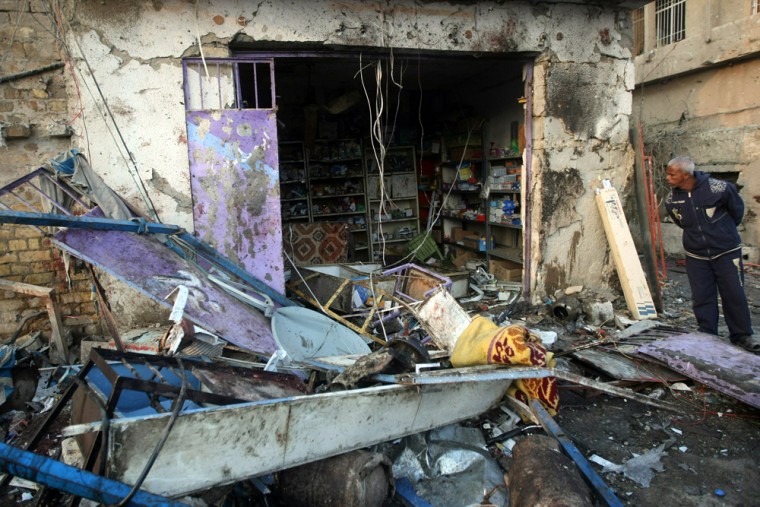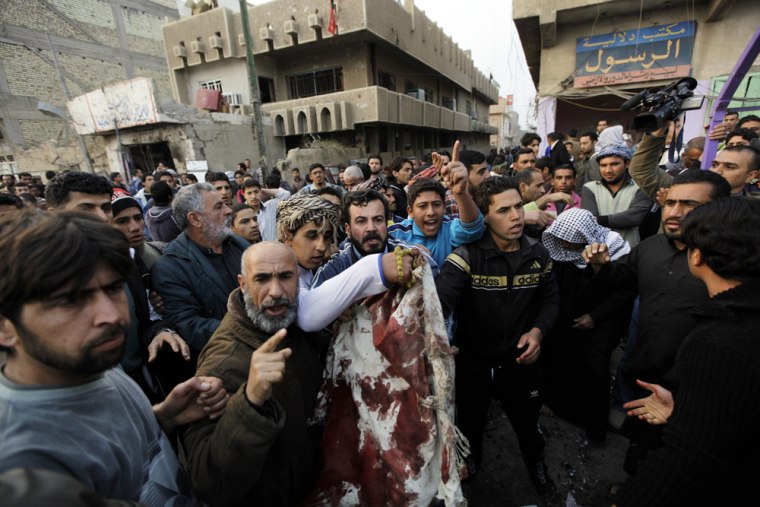A car bomb exploded outside a funeral tent Thursday in a mainly Shiite area of Baghdad, killing at least 48 people — the latest in a wave of attacks that has triggered fury over the government's inability to stop the bloodshed.
As ambulances raced to the scene and Iraqi helicopters buzzed overhead, young men enraged over the security lapse pelted Iraqi forces with sticks and stones, prompting skirmishes.
The violence over the past week and a half has mainly targeted the majority Shiite community and Iraqi security forces, posing a major challenge for Prime Minister Nouri al-Maliki and his fragile coalition government, which was seated last month.
Some lawmakers and city officials said insurgents were likely trying to undermine the government ahead of an Arab League summit to be held in March in Baghdad. The Iraqi leadership had campaigned to host the two-day meeting to tout security improvements and mend frayed ties with its Arab neighbors.
"The terrorists are carrying out these bombings now because they are angry over the successful formation of a new government and they want to try to foil the Arab Summit," said Kamil Nassir al-Zaidi, the head of the Baghdad provincial council. "But the summit will be held as scheduled despite all these bombings."
Anger over Thursday's attack in the former Shiite militia stronghold of Shula stemmed from the fact the booby-trapped car had been parked just several meters from one end of the long, hangar-like tent.
Associated Press Television News footage showed broken plastic chairs overturned inside the tent. Broken tea cups and other debris covered the patterned rugs on the floor. A mourner held up a torn, blood-soaked dishdasha, traditional dress worn by Iraqi men.
At least 48 people were killed and 121 wounded, according to police and hospital officials, who spoke on condition of anonymity because they weren't authorized to release the information. Several nearby cars and houses were damaged.
A witness who identified himself as Abu Ahmed al-Saiedi said mourners had been allowed to park near the funeral tent because most people in the neighborhood knew each other.
"I blame the neighborhood security officials for letting this car bomb enter the area without being checked," said al-Saiedi, who was hit in the arm with shrapnel. "When I saw people hurling stones at the security forces, I said to myself, 'They deserve that.'"
Iraqis have become used to high-profile bombings, often followed by long periods of calm.
But the recent uptick in violence, with more than 200 people killed in near-daily attacks since Jan. 18, has raised new concern about the readiness of the Iraqis to take over their own security.
Suspected insurgents launched three days of suicide attacks against police and police recruits last week and planted car bombs targeting Shiite pilgrims streaming into the holy city of Karbala in southern Iraq for a major religious rite.

The violence challenges the newly reappointed government of al-Maliki.
It also undermines confidence in the Iraqi security forces as U.S. troops prepare to withdraw this year, eight years after the U.S.-led invasion that toppled Sunni dictator Saddam Hussein.
Armed clashes broke out in Shula, in northwest Baghdad, after the bomb blast at the funeral, local officials and eyewitnesses said.
"People were angry after the explosion. They charged out into the streets to protest against the security forces," said Nasser al-Sadi, the manager of Sadr's office in Shula.
"The police opened fire against them or to disperse them, and then some of the people responded by shooting back," said Sadi.
Security forces poured into the area, told people to stay at home and were searching for the protesters who fired at police, he said.
An eyewitness who asked not to be identified said the police had fired into the air to disperse the angry crowds but than came under attack from gunmen. "Of course the police returned fire," the eyewitness said.
It was unclear if anyone was hurt in the shooting.
At least four other fatal bombings struck the Iraqi capital on Thursday.
A bomb planted inside a minibus killed two passengers and wounded seven pedestrians in the Jihad district of western Baghdad, an Interior Ministry source said.
In the central Karrada district, a roadside bomb killed a policeman and wounded three other officers, along with four civilians, the source said.
Roadside bombs also exploded in the northern Waziriya and north-central Bab al-Muadham areas, killing two people and wounding seven, the source said.
